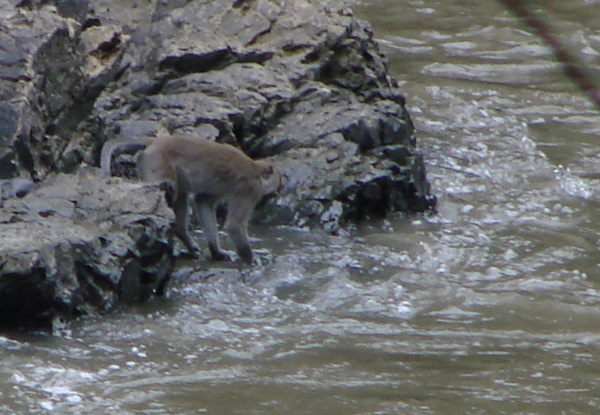Long-tailed macaques eat mostly fruit — but when resources are scarce, they’ve been known to get creative with their cuisine. When living near humans, they raid gardens and learn to beg for food. Sometimes they even steal food from inside houses.
Now, for the first time, scientists have observed long-tailed macaques fishing with their bare hands.
Nature Conservancy scientist Erik Meijaard and other researchers are the first to scientifically document this rare conduct. In a recent article published in the International Journal of Primatology, Meijaard and his coauthors say that, while conducting field studies in Indonesia, they have repeatedly observed long-tailed macaques catching fish from fast-flowing rivers.

“This is interesting behavior and some of the first observations of primates catching fish,” says Meijaard, the Conservancy's senior ecologist in Indonesia.
A Very Hungry Monkey?
In the first sighting back in 1998, researchers describe seeing five female macaques sitting alongside the Ketambe River in the Indonesian province of North Sumatra.
The macaques’ eyes scanned the water. After about three minutes, one of the macaques reached into the river. With her bare hands, she pulled out a fish and quickly ate it. Other macaques watched her — and one even tried unsuccessfully to catch a fish herself.
“Clearly it may raise the question of whether there is some sort of learning going on," says Meijaard. "If perhaps a couple of generations back, one primate caught a fish and it was subsequently copied.”
Researchers documented a similar sighting in 2006 in a separate macaque population in the Lesan Conservation Area, a Nature Conservancy program site in East Kalimantan, Indonesia. There, on two separate occasions, a macaque was observed swiftly grasping a fish out of the shallows before retreating into the forest with the fish still in its mouth.
While the fishing macaque sighting in Lesan coincided with a time of low fruit availability, Meijaard is hesitant to blame the fishing behavior on resource scarcity or draw conclusions about its meaning.
“It might be nothing more than a hungry monkey who is smart enough to extract nutrients from its environment,” he says.
Protecting Indonesia's Forests
Meijaard is also the Kalimantan coordinator for the USAID-funded Orangutan Conservation Services Program.
But he says that forests — not macaques or orangutans — are the Conservancy’s real focus.
The Conservancy is fighting an ongoing battle to protect the forests around the Lesan Conservation Area. These forests, which harbor a substantial orangutan population, are slated to be destroyed for agriculture and plantations.
The Conservancy is working around the clock to convince local communities and governments to instead consider their long-term economic needs and put the forests into permanent, sustainable management.
“Macaques and orangutans are neat symbols, but they’re not going to convince people here,” Meijaard says. “What we need is data that shows the microeconomic implications of forest conversion."
"Depending on the decisions made now, the forest could be around forever, or it could be gone forever by next year.”





Comments